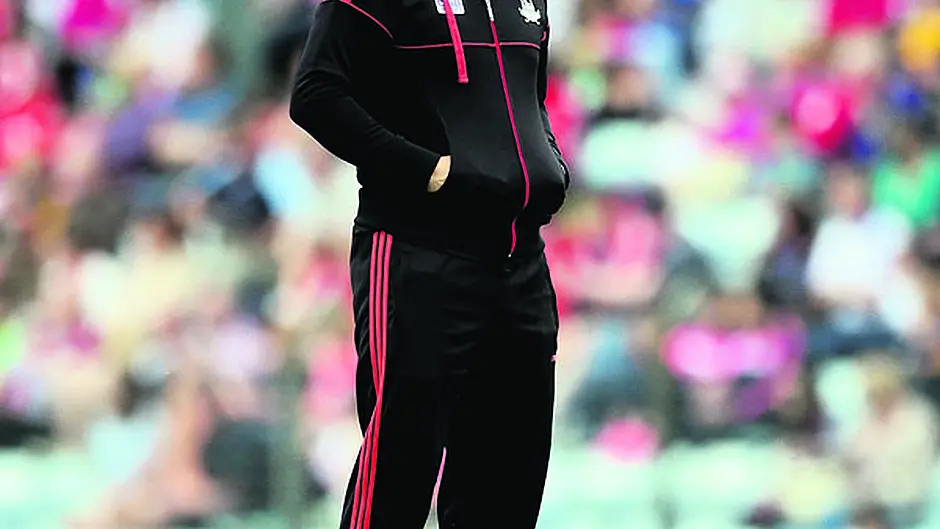New Cork football boss McCarthy is keen to lay down solid foundations
New Cork football boss McCarthy is keen to lay down solid foundations
BY DENIS HURLEY
NEW Cork football coach Ronan McCarthy didn’t have any hesitation when the opportunity to take charge of the Rebels came his way.
Douglas native McCarthy, who led Carbery Rangers to county SFC glory last year and who was previously a selector under Conor Counihan and Brian Cuthbert, admits that it wasn’t a hard sell.
‘No, not really,’ he said.
‘I was conscious of work and family commitments and so on, but, to be honest, it’s something I’d have always wanted to do at some stage. It’s a great opportunity in itself and with the stadium and everything else, you’d have been mad to say no, really.’
McCarthy will be assisted by selectors Eamonn Ryan – who was part of Peadar Healy’s set-up for the past two years – Urhan’s Ciarán O’Sullivan and Seán Hayes, who will also be the Cork U20 manager, having been U21 manager since 2014.
‘Things have come together without too many hiccups, to be honest,’ McCarthy said.
‘It’s great that I invited people to get involved and they were all very quick to come back and say yes.
‘It has been fairly event-free. Anyone who I’ve asked to get involved has done so and I was lucky too, I was appointed early, that gave me a bit of time.’
Overall though, McCarthy’s Cork set-up will be tight, with a platoon of ancillary staff unlikely.
‘A lot of intercounty teams have backroom teams now,’ he said.
‘I think, particularly starting out, let’s keep things simple. We’ll see how it develops but it wouldn’t be my plan to have a massive backroom team.
‘You don’t want the messages diluted or too many people delivering them. We won’t need to hire a second bus or anything like that.’
McCarthy’s two immediate predecessors, Cuthbert and Healy, were given two-year terms but the new man will be given three years. He’s keen not to allow that to be a safety blanket.
‘It’s helpful in that it probably gives an element of continuity,’ he said, ‘there has been a lot of change with two-year stints for managers.
‘At the end of the day, it’s an aspiration to do that and look beyond it, but you have to take it year by year.
‘The other thing is that a three-year plan is great, but very often your best chance is the year that’s ahead of you. You can be looking down the road and saying you’re building for three years’ time, but the opportunity could be now.’
Not that there is one magic silver bullet to turn Cork into All-Ireland contenders overnight, however.
‘It’s about messages you’re giving players over a period of time,’ he said, ‘the quality of the work you do with them - it’s having the belief in the value of what you’re doing, that that will eventually make a difference.
‘And we in the management have to back ourselves, that we’re confident we can make a difference, and I hope it will. At the end of the day you can get excited about backroom teams and so on, but it’s the quality of the work done on the pitch, night after night, that will eventually make the difference.
‘Nothing you do the week coming up to a big match will have a huge bearing. All the work has been done.
‘My experience working with different teams is that, if you put in that work, you’ll get a reward for it.’
Since his appointment, the Cork County Board have been keen to refer to McCarthy as coach rather than manager. Beyond semantics, he doesn’t see much significance in that.
‘As I understand it, I’m both, really,’ he said.
‘In the past, the manager might have appointed the coach whereas here, the manager is doing some or a lot of the coaching on the pitch.
‘It’s something I like doing and don’t have a problem with. There’s a logic to it, too – sometimes you appoint a person to the manager’s role because you think they bring quality X, Y and Z to the table, but he appoints a coach who may not bring the qualities the manager was appointed for.’
And those qualities don’t include setting targets in terms of how far Cork must go to make it a good year.
‘I don’t ever do that,’ he said.
‘I’m very short-term in how I’d look at things, I’d prefer to look at the block of training we’re doing in November and making sure that’s right.
‘At the end of the day, I could say, “If we make the super eights, that’s a success,” but other people mightn’t think that, and you might set targets and not meet them.
‘If you look at the hurling and the two years Kieran Kingston was there, it was regarded as a success, but it certainly wasn’t seen like that after year one. You have to keep that in mind too, that the judgment isn’t too narrow.









